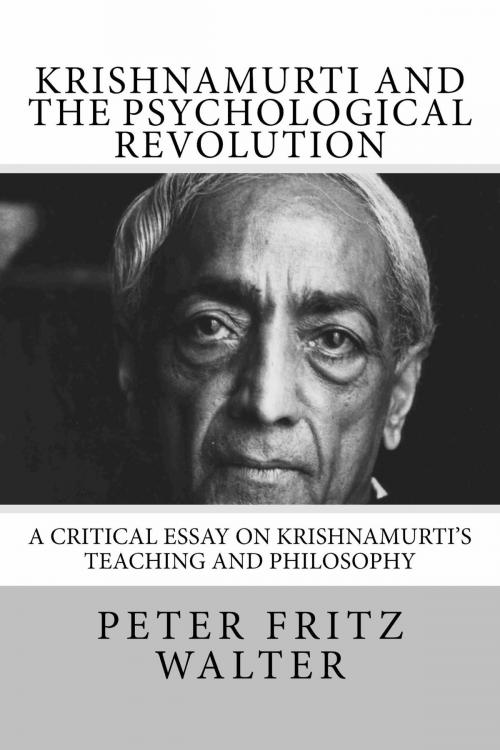Krishnamurti and the Psychological Revolution: A Critical Essay on Krishnamurti's Teaching and Philosophy
Nonfiction, Religion & Spirituality, Philosophy| Author: | Peter Fritz Walter | ISBN: | 9781311549013 |
| Publisher: | Peter Fritz Walter | Publication: | December 8, 2014 |
| Imprint: | Smashwords Edition | Language: | English |
| Author: | Peter Fritz Walter |
| ISBN: | 9781311549013 |
| Publisher: | Peter Fritz Walter |
| Publication: | December 8, 2014 |
| Imprint: | Smashwords Edition |
| Language: | English |
‘Krishnamurti and the Psychological Revolution’ is an essay on the unique teaching of J. Krishnamurti. It starts with the question ‘What is Consciousness?’—and carefully proposes a holistic definition, after reviewing the various psychological and spiritual theories that deal with this subject.
The author actually goes a step ahead and focuses on a more particular issue, a provocative question asked by K: “How to empty consciousness of its content?” When the author was part of a Krishnamurti circle in Switzerland back in 1986, he proposed to elucidate the matter with a keynote on the topic. An essay followed which was the core of the present book.
Krishnamurti lectured that only a ‘psychological revolution’ can lead man to a transformation of thought and taught that it was possible to ‘empty the content of consciousness’ on an individual level so as to completely renew and transform our thought and emotional patterns, and to free us from self-restrictive and limitative conditioning.
However, a careful examination of the question brought the author to the insight that consciousness cannot be emptied; what can be done instead is to integrate its content by the development of total awareness and vigilant attention. In other words, while the process of thought cannot be stopped, it is well possible to change the quality of our daily thoughts, of our self-talk and of our regard upon emotions. In this sense, it is true that, while we cannot change thought—because we need it for our cultural and technological progress—we can well change the thinker. And it is the latter what Krishnamurti meant by saying that we should ‘empty consciousness of its content.’
‘Krishnamurti and the Psychological Revolution’ is an essay on the unique teaching of J. Krishnamurti. It starts with the question ‘What is Consciousness?’—and carefully proposes a holistic definition, after reviewing the various psychological and spiritual theories that deal with this subject.
The author actually goes a step ahead and focuses on a more particular issue, a provocative question asked by K: “How to empty consciousness of its content?” When the author was part of a Krishnamurti circle in Switzerland back in 1986, he proposed to elucidate the matter with a keynote on the topic. An essay followed which was the core of the present book.
Krishnamurti lectured that only a ‘psychological revolution’ can lead man to a transformation of thought and taught that it was possible to ‘empty the content of consciousness’ on an individual level so as to completely renew and transform our thought and emotional patterns, and to free us from self-restrictive and limitative conditioning.
However, a careful examination of the question brought the author to the insight that consciousness cannot be emptied; what can be done instead is to integrate its content by the development of total awareness and vigilant attention. In other words, while the process of thought cannot be stopped, it is well possible to change the quality of our daily thoughts, of our self-talk and of our regard upon emotions. In this sense, it is true that, while we cannot change thought—because we need it for our cultural and technological progress—we can well change the thinker. And it is the latter what Krishnamurti meant by saying that we should ‘empty consciousness of its content.’















